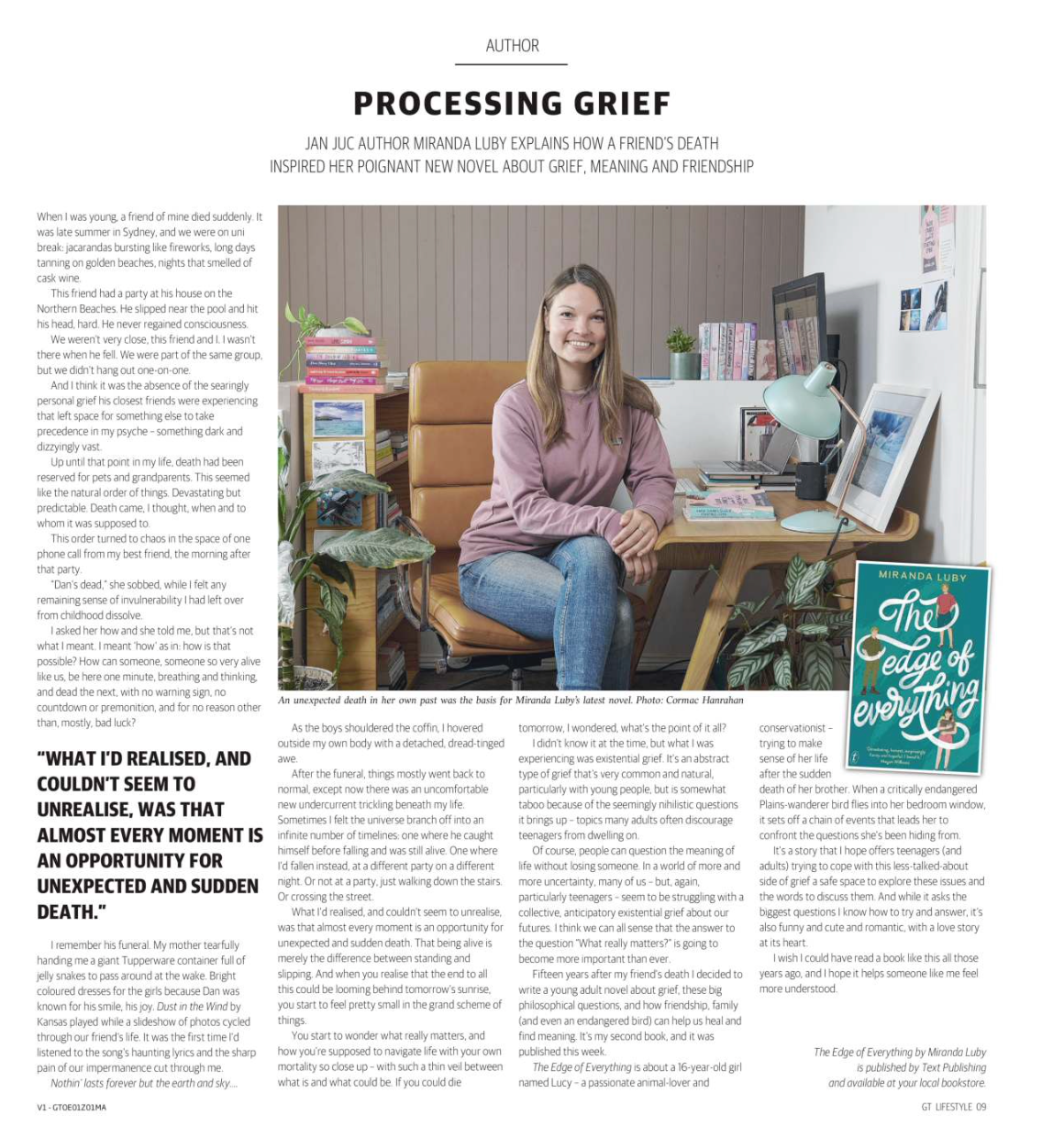Geelong Today Magazine: Processing Grief

A friend’s death has inspired a poignant new novel about grief, meaning, and friendship by Jan Juc author Miranda Luby
When I young, a friend of mine died suddenly. It was late summer in Sydney, and we were on uni break: jacarandas bursting like fireworks, long days tanning on golden beaches, nights that smelled of cask wine. This friend had a party at his house on the Northern Beaches. He slipped near the pool and hit his head, hard. He never regained consciousness.
We weren’t very close, this friend and me. I wasn’t there when he fell. We were part of the same group, but we didn’t hang out one-on-one. And I think it was the absence of the searingly personal grief his closest friends were experiencing that left space for something else to take precedence in my psyche—something dark and dizzyingly vast.
Up until that point in my life, death had been reserved for pets and grandparents. This seemed like the natural order of thing. Devastating but predictable. Death came, I thought, when and to whom it was supposed to. This order turned to chaos is the space of one phone call from my best friend, the morning after that party.
“Dan’s dead,” she sobbed, while I felt any remaining sense of invulnerability I had left over from childhood dissolve.
I asked her how and she told me, but that’s not what I meant. I meant ‘how’ as in: how is that possible? How can someone, someone so very alive like us, be here one minute, breathing and thinking, and dead the next, with no warning sign, no countdown or premonition, and for no reason other than, mostly, bad luck?
I remember his funeral. My mother tearfully handing me a giant Tupperware container full of jelly snakes to pass around at the wake. Bright coloured dresses for the girls because Dan was known for his smile, his joy. Dust in the Wind by Kansas played while a slideshow of photos cycled through our friend’s life. It was the first time I’d listened to the song’s haunting lyrics and the sharp pain of our impermanence cut through me. Nothin' lasts forever but the earth and sky. As the boys shouldered the coffin, I hovered outside my own body with a detached, dread-tinged awe.
After the funeral things mostly went back to normal, except now there was an uncomfortable new undercurrent trickling beneath my life. Sometimes I felt the universe branch off into an infinite number of timelines: one where he caught himself before falling and was still alive. One where I’d fallen instead, at a different party on a different night. Or not at a party, just walking down the stairs. Or crossing the street.
What I’d realised, and couldn’t seem to unrealise, was that almost every moment is an opportunity for unexpected and sudden death. That being alive is merely the difference between standing and slipping. And when you realise that the end to all this could be looming behind tomorrow’s sunrise, you start to feel pretty small in the grand scheme of things. You start to wonder what really matters, and how you’re supposed to navigate life with you own mortality so close up—with such a thin veil between what is and what could be. If you could die tomorrow, I wondered, what’s the point of it all?
I didn’t know it at the time, but what I was experiencing was existential grief. It’s an abstract type of grief that’s very common and natural, particularly with young people, but is somewhat taboo because of the seemingly nihilistic questions it brings up—topics many adults often discourage teenagers from dwelling on.
Of course, people can question the meaning of life without losing someone. In a world of more and more uncertainty, many of us—but again, particularly teenagers—seem to be struggling with a collective, anticipatory existential grief about our futures. I think we can all sense that the answer to the question ‘what really matters?’ is going to become more important than ever.
Fifteen years after my friend’s death I decided to write a young adult novel about grief, these big philosophical questions, and how friendship, family (and even an endangered bird) can help us heal and find meaning. It’s my second book, and it was published this week.
The Edge of Everything is about a sixteen-year-old girl named Lucy—a passionate animal-lover and conservationist—trying to make sense of her life after the sudden death of her brother. When a critically endangered Plains-wanderer bird flies into her bedroom window, it sets off a chain of events that leads her to confront the questions she’s been hiding from.
It’s a story that I hope offers teenagers (and adults) trying to cope with this less talked-about side of grief a safe space to explore these issues and the words to discuss them. And while it asks the biggest questions I know how to try and answer, it’s also funny and cute and romantic, with a love story at its heart. I wish I could have read a book like this all those years ago, and I hope it helps someone like me feel more understood.
Miranda Luby’s second novel is a heartfelt portrayal of grief, a tender romance, and a tribute to a very special Australian bird—a celebration of life in all its randomness and wonder. The Edge of Everything is out now with Text Publishing and available at your local bookstore.
Post a comment